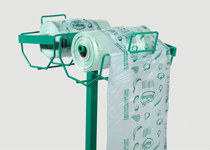Bin Liners
Paper bags for the collection of organic waste, made from compostable paper and certified according to EN 13432:2002. Pack of 50 / 12 packs per Carton.
- recycled paper, 100% compostable according to EN 13432 standard
- one-colour print with nontoxic ink
- havana colour
- standard sizes 8 and 10-litre capacity
- OK-COMPOST certified
Current stock may include 2 different sizes:
Width x Height x Depth - cm - measured when Bag is folded open with flat bottom -
UMISAC 8L: 19 x 31 x 14 (gusset)
UMISAC 10L: 19 x 35 x 14 (gusset)
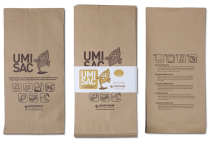
This 8L liner fits the Max Air bin. BioBag bags replace plastic and can be disposed of in composts or green waste collections. They can be used in organic farm production and food contact applications. Manufactured from Mater-Bi; the first family of bioplastics that use vegetable components such as starch, cellulose and vegetable oils and biodegradable polymer and natural plasticizers, all crops used are non-food origin. Also some of these crops are grown to assist in remedial land recovery. To be more specific, the oils are from weed seeds grown on marginal wasteland in a European Union country and specifically no Palm oil. All grades are compostable and biodegradable during composting and include sustainable and renewable resources.
BioBag products reduce climate change gas emissions; CO2 is absorbed from the atmosphere and O2 generated during the growing phase, a positive contribution to the reduction of climate change emissions and the carbon footprint. Also saving the consumption of energy and non-renewable resources (petroleum) when compared to alternative products. BioBag’s use raw materials of agricultural origin, creating products fit for purpose; these are then returned to the soil from where they came, completing a natural, virtuous cycle; referred to as Cradle to Cradle not Cradle to Grave.
BioBag’s are certified compostable in home and commercial composts and may be placed in a green waste collection. The Mater-Bi material breaths so CO2, O2 and water vapour transmission rates are high making bags very suitable for keeping produce fresh, no sweating with food or skin contact applications. They maybe used for food contact applications with high resistance to fats, oils and acidic foods. Safe for animal feed like worm or pig farms, even sea creatures can digest BioBag’s. The decomposition rate depends on bacterial activity, the temperature and the moisture level; in hot quality compost BioBag’s will decompose much quicker than the international standards (180 days) with no polymeric or toxic residue.
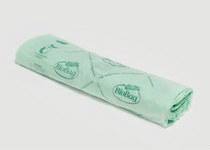
8L BioBag star-base liner 38.5 x 40cm - roll with Band Wrap - fits Max Air bin Caddy - roll of 35 liners / 12 rolls per Carton. BioBags are made from Mater-Bi®, a compostable resin derived from plants, vegetable oils and compostable polymers - and unlike degradable and landfill biodegradable bags that simply break down into thousands of particles of polluting microplastics, BioBags comply with these standards for compostability: home compostable AS5810 and commercial compostable AS4736, which means they genuinely break down into organic matter.
They offer the strength of regular plastic bags whilst being an easy, hygienic and environmentally friendly solution for both household and commercial kitchens, as they will break down in the presence of micro-organisms and oxygen making it an excellent alternative anywhere a bin liner is used.
BioBags, in combination with the Max Air Ventilated Caddy is the world’s leading system for pre-sorting food waste used in over 2 million households worldwide. BioBags are not only compostable but breathable to ensure good ventilation and allow the moisture in the waste to evaporate. Due to the moisture evaporation, the organic waste dries out and reduces unpleasant odours.
The 8 litre rolls are also popular for taking your own bags to the shops to buy fresh produce and bread. After shopping, you can use them at home to line your kitchen caddy and collect food scraps. Then, place them in your own compost system or in your local council bin to complete the cycle.
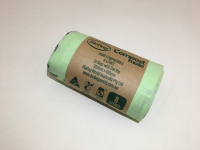
This 10L liner fits the Tall Air bin. BioBag bags replace plastic and can be disposed of in composts or green waste collections. They can be used in organic farm production and food contact applications. Manufactured from Mater-Bi; the first family of bioplastics that use vegetable components such as starch, cellulose and vegetable oils and biodegradable polymer and natural plasticizers, all crops used are non-food origin. Also some of these crops are grown to assist in remedial land recovery. To be more specific, the oils are from weed seeds grown on marginal wasteland in a European Union country and specifically no Palm oil. All grades are compostable and biodegradable during composting and include sustainable and renewable resources.
BioBag products reduce climate change gas emissions; CO2 is absorbed from the atmosphere and O2 generated during the growing phase, a positive contribution to the reduction of climate change emissions and the carbon footprint. Also saving the consumption of energy and non-renewable resources (petroleum) when compared to alternative products. BioBag’s use raw materials of agricultural origin, creating products fit for purpose; these are then returned to the soil from where they came, completing a natural, virtuous cycle; referred to as Cradle to Cradle not Cradle to Grave.
BioBag’s are certified compostable in home and commercial composts and may be placed in a green waste collection. The Mater-Bi material breaths so CO2, O2 and water vapour transmission rates are high making bags very suitable for keeping produce fresh, no sweating with food or skin contact applications. They maybe used for food contact applications with high resistance to fats, oils and acidic foods. Safe for animal feed like worm or pig farms, even sea creatures can digest BioBag’s. The decomposition rate depends on bacterial activity, the temperature and the moisture level; in hot quality compost BioBag’s will decompose much quicker than the international standards (180 days) with no polymeric or toxic residue.

A popular size for most standard kitchen bins. BioBags replace plastic and can be disposed of in composts or green waste collections. Ideal for use in organic farm production and with food contact. Manufactured from Mater-Bi; the first family of bioplastics that use vegetable components such as starch, cellulose and vegetable oils and biodegradable polymer and natural plasticizers, all crops used are non-food origin. Also some of these crops are grown to assist in remedial land recovery. To be more specific, the oils are from weed seeds grown on marginal wasteland in a European Union country and specifically no Palm oil. All grades are compostable and biodegradable during composting and include sustainable and renewable resources.
BioBag products reduce climate change gas emissions; CO2 is absorbed from the atmosphere and O2 generated during the growing phase, a positive contribution to the reduction of climate change emissions and the carbon footprint. Also saving the consumption of energy and non-renewable resources (petroleum) when compared to alternative products. BioBag’s use raw materials of agricultural origin, creating products fit for purpose; these are then returned to the soil from where they came, completing a natural, virtuous cycle; referred to as Cradle to Cradle not Cradle to Grave.
BioBag’s are certified compostable in home and commercial composts and may be placed in a green waste collection. The Mater-Bi material breaths so CO2, O2 and water vapour transmission rates are high making bags very suitable for keeping produce fresh, no sweating with food or skin contact applications. They maybe used for food contact applications with high resistance to fats, oils and acidic foods. Safe for animal feed like worm or pig farms, even sea creatures can digest BioBag’s. The decomposition rate depends on bacterial activity, the temperature and the moisture level; in hot quality compost BioBag’s will decompose much quicker than the international standards (180 days) with no polymeric or toxic residue.
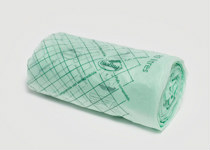
Strong and durable to hold food and garden waste. BioBag bags can be disposed of in composts or green waste collections. They can be used in organic farm production and food contact applications. Manufactured from Mater-Bi; the first family of bioplastics that use vegetable components such as starch, cellulose and vegetable oils and biodegradable polymer and natural plasticizers, all crops used are non-food origin. Also some of these crops are grown to assist in remedial land recovery. To be more specific, the oils are from weed seeds grown on marginal wasteland in a European Union country and specifically no Palm oil. All grades are compostable and biodegradable during composting and include sustainable and renewable resources.
BioBag products reduce climate change gas emissions; CO2 is absorbed from the atmosphere and O2 generated during the growing phase, a positive contribution to the reduction of climate change emissions and the carbon footprint. Also saving the consumption of energy and non-renewable resources (petroleum) when compared to alternative products. BioBag’s use raw materials of agricultural origin, creating products fit for purpose; these are then returned to the soil from where they came, completing a natural, virtuous cycle; referred to as Cradle to Cradle not Cradle to Grave.
BioBag’s are certified compostable in home and commercial composts and may be placed in a green waste collection. The Mater-Bi material breaths so CO2, O2 and water vapour transmission rates are high making bags very suitable for keeping produce fresh, no sweating with food or skin contact applications. They maybe used for food contact applications with high resistance to fats, oils and acidic foods. Safe for animal feed like worm or pig farms, even sea creatures can digest BioBag’s. The decomposition rate depends on bacterial activity, the temperature and the moisture level; in hot quality compost BioBag’s will decompose much quicker than the international standards (180 days) with no polymeric or toxic residue.
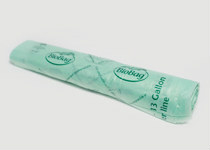
Strong and durable to hold food and garden waste. BioBag bags can be disposed of in composts or green waste collections. They can be used in organic farm production and food contact applications. Manufactured from Mater-Bi; the first family of bioplastics that use vegetable components such as starch, cellulose and vegetable oils and biodegradable polymer and natural plasticizers, all crops used are non-food origin. Also some of these crops are grown to assist in remedial land recovery. To be more specific, the oils are from weed seeds grown on marginal wasteland in a European Union country and specifically no Palm oil. All grades are compostable and biodegradable during composting and include sustainable and renewable resources.
BioBag products reduce climate change gas emissions; CO2 is absorbed from the atmosphere and O2 generated during the growing phase, a positive contribution to the reduction of climate change emissions and the carbon footprint. Also saving the consumption of energy and non-renewable resources (petroleum) when compared to alternative products. BioBag’s use raw materials of agricultural origin, creating products fit for purpose; these are then returned to the soil from where they came, completing a natural, virtuous cycle; referred to as Cradle to Cradle not Cradle to Grave.
BioBag’s are certified compostable in home and commercial composts and may be placed in a green waste collection. The Mater-Bi material breaths so CO2, O2 and water vapour transmission rates are high making bags very suitable for keeping produce fresh, no sweating with food or skin contact applications. They maybe used for food contact applications with high resistance to fats, oils and acidic foods. Safe for animal feed like worm or pig farms, even sea creatures can digest BioBag’s. The decomposition rate depends on bacterial activity, the temperature and the moisture level; in hot quality compost BioBag’s will decompose much quicker than the international standards (180 days) with no polymeric or toxic residue.
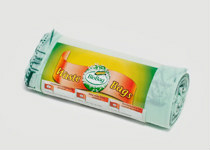
BioBag liner 45L 65 x 74cm - Price/roll of 25 (16/outer)
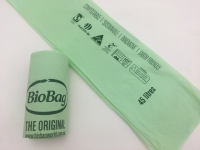
BioBag bags replace plastic and can be disposed of in composts or green waste collections. They can be used in organic farm production and food contact applications. Manufactured from Mater-Bi; the first family of bioplastics that use vegetable components such as starch, cellulose and vegetable oils and biodegradable polymer and natural plasticizers, all crops used are non-food origin. Also some of these crops are grown to assist in remedial land recovery. To be more specific, the oils are from weed seeds grown on marginal wasteland in a European Union country and specifically no Palm oil. All grades are compostable and biodegradable during composting and include sustainable and renewable resources.
BioBag products reduce climate change gas emissions; CO2 is absorbed from the atmosphere and O2 generated during the growing phase, a positive contribution to the reduction of climate change emissions and the carbon footprint. Also saving the consumption of energy and non-renewable resources (petroleum) when compared to alternative products. BioBag’s use raw materials of agricultural origin, creating products fit for purpose; these are then returned to the soil from where they came, completing a natural, virtuous cycle; referred to as Cradle to Cradle not Cradle to Grave.
BioBag’s are certified compostable in home and commercial composts and may be placed in a green waste collection. The Mater-Bi material breaths so CO2, O2 and water vapour transmission rates are high making bags very suitable for keeping produce fresh, no sweating with food or skin contact applications. They maybe used for food contact applications with high resistance to fats, oils and acidic foods. Safe for animal feed like worm or pig farms, even sea creatures can digest BioBag’s. The decomposition rate depends on bacterial activity, the temperature and the moisture level; in hot quality compost BioBag’s will decompose much quicker than the international standards (180 days) with no polymeric or toxic residue.
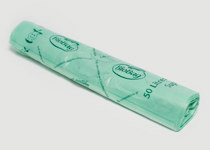
Strong and durable to hold food and garden waste. BioBag bags can be disposed of in composts or green waste collections. They can be used in organic farm production and food contact applications. Manufactured from Mater-Bi; the first family of bioplastics that use vegetable components such as starch, cellulose and vegetable oils and biodegradable polymer and natural plasticizers, all crops used are non-food origin. Also some of these crops are grown to assist in remedial land recovery. To be more specific, the oils are from weed seeds grown on marginal wasteland in a European Union country and specifically no Palm oil. All grades are compostable and biodegradable during composting and include sustainable and renewable resources.
BioBag products reduce climate change gas emissions; CO2 is absorbed from the atmosphere and O2 generated during the growing phase, a positive contribution to the reduction of climate change emissions and the carbon footprint. Also saving the consumption of energy and non-renewable resources (petroleum) when compared to alternative products. BioBag’s use raw materials of agricultural origin, creating products fit for purpose; these are then returned to the soil from where they came, completing a natural, virtuous cycle; referred to as Cradle to Cradle not Cradle to Grave.
BioBag’s are certified compostable in home and commercial composts and may be placed in a green waste collection. The Mater-Bi material breaths so CO2, O2 and water vapour transmission rates are high making bags very suitable for keeping produce fresh, no sweating with food or skin contact applications. They maybe used for food contact applications with high resistance to fats, oils and acidic foods. Safe for animal feed like worm or pig farms, even sea creatures can digest BioBag’s. The decomposition rate depends on bacterial activity, the temperature and the moisture level; in hot quality compost BioBag’s will decompose much quicker than the international standards (180 days) with no polymeric or toxic residue.
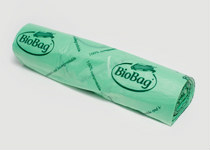
Strong and durable to hold food and garden waste. BioBag bags can be disposed of in composts or green waste collections. They can be used in organic farm production and food contact applications. Manufactured from Mater-Bi; the first family of bioplastics that use vegetable components such as starch, cellulose and vegetable oils and biodegradable polymer and natural plasticizers, all crops used are non-food origin. Also some of these crops are grown to assist in remedial land recovery. To be more specific, the oils are from weed seeds grown on marginal wasteland in a European Union country and specifically no Palm oil. All grades are compostable and biodegradable during composting and include sustainable and renewable resources.
BioBag products reduce climate change gas emissions; CO2 is absorbed from the atmosphere and O2 generated during the growing phase, a positive contribution to the reduction of climate change emissions and the carbon footprint. Also saving the consumption of energy and non-renewable resources (petroleum) when compared to alternative products. BioBag’s use raw materials of agricultural origin, creating products fit for purpose; these are then returned to the soil from where they came, completing a natural, virtuous cycle; referred to as Cradle to Cradle not Cradle to Grave.
BioBag’s are certified compostable in home and commercial composts and may be placed in a green waste collection. The Mater-Bi material breaths so CO2, O2 and water vapour transmission rates are high making bags very suitable for keeping produce fresh, no sweating with food or skin contact applications. They maybe used for food contact applications with high resistance to fats, oils and acidic foods. Safe for animal feed like worm or pig farms, even sea creatures can digest BioBag’s. The decomposition rate depends on bacterial activity, the temperature and the moisture level; in hot quality compost BioBag’s will decompose much quicker than the international standards (180 days) with no polymeric or toxic residue.
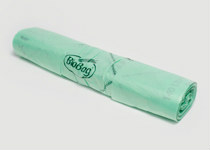
BioBag Liner 160 Litre, 98 x 126cm - roll of 10
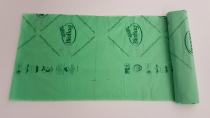
Strong and durable to hold food and garden waste. BioBag bags can be disposed of in composts or green waste collections. They can be used in organic farm production and food contact applications. Manufactured from Mater-Bi; the first family of bioplastics that use vegetable components such as starch, cellulose and vegetable oils and biodegradable polymer and natural plasticizers, all crops used are non-food origin. Also some of these crops are grown to assist in remedial land recovery. To be more specific, the oils are from weed seeds grown on marginal wasteland in a European Union country and specifically no Palm oil. All grades are compostable and biodegradable during composting and include sustainable and renewable resources.
BioBag products reduce climate change gas emissions; CO2 is absorbed from the atmosphere and O2 generated during the growing phase, a positive contribution to the reduction of climate change emissions and the carbon footprint. Also saving the consumption of energy and non-renewable resources (petroleum) when compared to alternative products. BioBag’s use raw materials of agricultural origin, creating products fit for purpose; these are then returned to the soil from where they came, completing a natural, virtuous cycle; referred to as Cradle to Cradle not Cradle to Grave.
BioBag’s are certified compostable in home and commercial composts and may be placed in a green waste collection. The Mater-Bi material breaths so CO2, O2 and water vapour transmission rates are high making bags very suitable for keeping produce fresh, no sweating with food or skin contact applications. They maybe used for food contact applications with high resistance to fats, oils and acidic foods. Safe for animal feed like worm or pig farms, even sea creatures can digest BioBag’s. The decomposition rate depends on bacterial activity, the temperature and the moisture level; in hot quality compost BioBag’s will decompose much quicker than the international standards (180 days) with no polymeric or toxic residue.
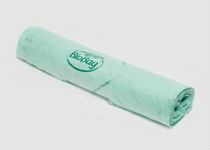
BioBag Crate Liner 102 x 66cm - fits most crates, including Ventilated Vegetable Crate, etc. Compostable in home and commercial composts.
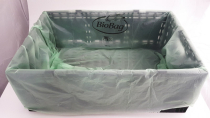
BG190439 - 1 Ltr BioBag - Desk Cube Liner - NOT AVAILABLE CURRENTLY - email to enquire / Alternative to consider = HP186451 - email us to enquire & request a sample.
A Friendlypak Desk Cube, lined with this BioBag compostable liner, is all that is needed to revolutionise waste collections within the office and business environment. Manufactured from Mater-Bi; the first family of bioplastics that use vegetable components such as starch, cellulose and vegetable oils and biodegradable polymer and natural plasticizers, all crops used are non-food origin. Also some of these crops are grown to assist in remedial land recovery. To be more specific, the oils are from weed seeds grown on marginal wasteland in a European Union country and specifically no Palm oil. All grades are compostable and biodegradable during composting and include sustainable and renewable resources.
BioBag products reduce climate change gas emissions; CO2 is absorbed from the atmosphere and O2 generated during the growing phase, a positive contribution to the reduction of climate change emissions and the carbon footprint. Also saving the consumption of energy and non-renewable resources (petroleum) when compared to alternative products. BioBag’s use raw materials of agricultural origin, creating products fit for purpose; these are then returned to the soil from where they came, completing a natural, virtuous cycle; referred to as Cradle to Cradle not Cradle to Grave.
BioBag’s are certified compostable in home and commercial composts and may be placed in a green waste collection. The Mater-Bi material breaths so CO2, O2 and water vapour transmission rates are high making bags very suitable for keeping produce fresh, no sweating with food or skin contact applications. They maybe used for food contact applications with high resistance to fats, oils and acidic foods. Safe for animal feed like worm or pig farms, even sea creatures can digest BioBag’s. The decomposition rate depends on bacterial activity, the temperature and the moisture level; in hot quality compost BioBag’s will decompose much quicker than the international standards (180 days) with no polymeric or toxic residue.
The shelf life of BioBag products is approximately 1.5 years from the manufactured date, they will look the same after this period but will gradually loose strength as they biodegrade. As biodegradability depends on: 1) Temperature. 2) Moisture. 3) Microbiological activity and 4) Light exposure, it is best to store BioBag’s in a cool, dry, dark place.
All BioBag products, including the inks or dyes, are fully independently certified to many international standards including European EN13432, American ASTM D6400 and AIB-Vincotte ‘OK Home Compost’.
BioBag International and BioBag Production are audited by AIB-Vinçotte International and are ISO accredited according the requirements of EN ISO 9001: 2008 “Quality Management System” and EN ISO 14001: 2004 “Environmental Management System”.
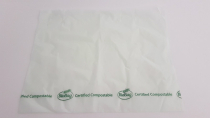
Replace current food & freezer plastic bags with BioBag compostable Food & Freezer Bags. BioBag freezer bag transparent 4L 24 x 40cm - Price/roll of 25 (18/outer).
- Used and approved for food storage.
- For private use, retail, wholesale, ecommerce etc.
- Shelf-ready with contemporary designed packaging
- BPA and GMO Free.
- Can be reused for organic waste collection at home.
- An easy tool to make a positive environmental impact.
- OK compost INDUSTRIAL certified by TÜV AUSTRIA.
BioBag compostable Food & Freezer Bags are a great match for environmentally conscious consumers and retail owners, who want to change behaviour for a better environment. BioBag compostable Food & Freezer Bags have the exact same features as conventional plastic freezer bags, EXCEPT the harmful consequences of microplastics going into our environment. They are an amazing tool to reduce and minimise unnecessary production and use of conventional plastic, and support your environmental agenda, efforts, and profile.
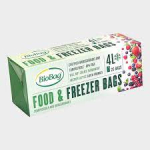
BioBags replace plastic and can be disposed of in composts or green waste collections. They can be used in organic farm production and food contact applications. Manufactured from Mater-Bi; the first family of bioplastics that use vegetable components such as starch, cellulose and vegetable oils and biodegradable polymer and natural plasticizers, all crops used are non-food origin. Also some of these crops are grown to assist in remedial land recovery. To be more specific, the oils are from weed seeds grown on marginal wasteland in a European Union country and specifically no Palm oil. All grades are compostable and biodegradable during composting and include sustainable and renewable resources.
BioBag products reduce climate change gas emissions; CO2 is absorbed from the atmosphere and O2 generated during the growing phase, a positive contribution to the reduction of climate change emissions and the carbon footprint. Also saving the consumption of energy and non-renewable resources (petroleum) when compared to alternative products. BioBag’s use raw materials of agricultural origin, creating products fit for purpose; these are then returned to the soil from where they came, completing a natural, virtuous cycle; referred to as Cradle to Cradle not Cradle to Grave.
BioBag’s are certified compostable in home and commercial composts and may be placed in a green waste collection. The Mater-Bi material breaths so CO2, O2 and water vapour transmission rates are high making bags very suitable for keeping produce fresh, no sweating with food or skin contact applications. They maybe used for food contact applications with high resistance to fats, oils and acidic foods. Safe for animal feed like worm or pig farms, even sea creatures can digest BioBag’s. The decomposition rate depends on bacterial activity, the temperature and the moisture level; in hot quality compost BioBag’s will decompose much quicker than the international standards (180 days) with no polymeric or toxic residue.

A convenient way to store and dispense our compostable 5L BioBags quickly and easily. Sturdy, attractive stand, designed for two rolls. Great for supermarkets, produce merchants, markets, and health food stores. Available at a subsidised price, conditions apply, please contact us. Manufactured from Mater-Bi; the first family of bioplastics that use vegetable components such as starch, cellulose and vegetable oils and biodegradable polymer and natural plasticizers, all crops used are non-food origin. Also some of these crops are grown to assist in remedial land recovery. To be more specific, the oils are from weed seeds grown on marginal wasteland in a European Union country and specifically no Palm oil. All grades are compostable and biodegradable during composting and include sustainable and renewable resources.
BioBag products reduce climate change gas emissions; CO2 is absorbed from the atmosphere and O2 generated during the growing phase, a positive contribution to the reduction of climate change emissions and the carbon footprint. Also saving the consumption of energy and non-renewable resources (petroleum) when compared to alternative products. BioBag’s use raw materials of agricultural origin, creating products fit for purpose; these are then returned to the soil from where they came, completing a natural, virtuous cycle; referred to as Cradle to Cradle not Cradle to Grave.
BioBag’s are certified compostable in home and commercial composts and may be placed in a green waste collection. The Mater-Bi material breaths so CO2, O2 and water vapour transmission rates are high making bags very suitable for keeping produce fresh, no sweating with food or skin contact applications. They maybe used for food contact applications with high resistance to fats, oils and acidic foods. Safe for animal feed like worm or pig farms, even sea creatures can digest BioBag’s. The decomposition rate depends on bacterial activity, the temperature and the moisture level; in hot quality compost BioBag’s will decompose much quicker than the international standards (180 days) with no polymeric or toxic residue.
